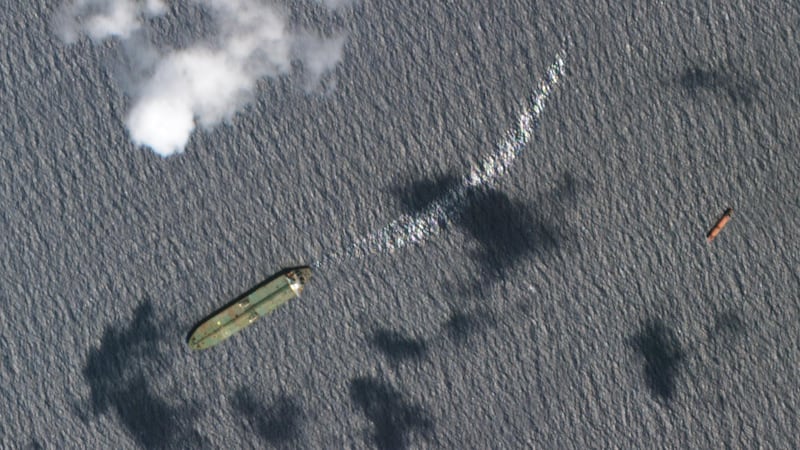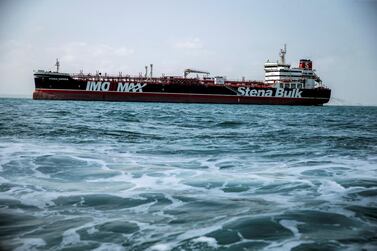Britain has urgently called the Iranian ambassador to a meeting after accusing Tehran of selling the Grace 1 tanker oil to Syria.
It comes after Iran repeatedly gave assurances it would not deliver oil to any EU-sanctioned entity in Syria or elsewhere prior to the release of its detained vessel in Gibraltar.
Images at the weekend showed the tanker, which was renamed the Adrian Darya 1 after its detention was lifted, in Syria.
On Tuesday Britain's foreign office said it was clear that the oil had been transferred to Syria.
Foreign Secretary Dominic Raab said: "Iran has shown complete disregard for its own assurances over Adrian Darya 1.
"This sale of oil to [Syrian President Bashar Al Assad's] brutal regime is part of a pattern of behaviour by the Government of Iran designed to disrupt regional security.
"This includes illegally supplying weapons to Houthi insurgents in Yemen, support for Hezbollah terrorists and most recently its attempts to hijack commercial ships passing through the Gulf.
"We want Iran to come in from the cold but the only way to do that is to keep its word and comply with the rules based international system."
The vessel had been seized by British Royal Marine commandos on July 4 on suspicion of being en route to Syria.
Its detention had caused a diplomatic war of words with Iran which called the seizure an "act of piracy".
Gibraltar released it on August 15 after receiving formal written assurances from Tehran that the ship would not discharge its 2.1 million barrels of oil in Syria.
The UK's Foreign Office has summoned the Iranian Ambassador to a meeting to condemn the nation's actions and it says it will raise the issue at the United Nations later this month.
"Iran’s actions represent an unacceptable violation of international norms," Mr Raab said.
In another twist, US national security adviser John Bolton was sacked by President Donald Trump after the UK's announcement on Tuesday.
He had accused Tehran of "lying and spreading terror" in a tweet on Saturday which appeared to show the Iranian tanker Grace 1 at anchor near the Syrian port of Tartus.
Mr Bolton shared a satellite photograph on Saturday showing the tanker only two nautical miles from the deepwater port.
"Anyone who said the Adrian Darya 1 wasn't headed to Syria is in denial," Mr Bolton said.
“Tehran thinks it’s more important to fund the murderous Assad regime than provide for its own people."
US officials were surprised when the Gibraltar court released the vessel and said the UK had made a mistake in trusting the word of Iranian Foreign Minister Javad Zarif.
US Secretary of State Mike Pompeo said on August 31 that Washington had “reliable information” that the tanker was heading to Syria.
The US issued a warrant for the ship to be seized, saying it was part of a network of vessels being operated by Iran’s Revolutionary Guards to supply oil to the Syrian regime.
The US sanctions on Iran's vital oil exports have escalated tensions in the Gulf region in recent months, with a series of unclaimed attacks on oil tankers that Washington has blamed on Tehran.
Iran has also seized a number of foreign vessels including oil tankers and threatened to block the Strait of Hormuz — a chokepoint for a third of world's seaborne oil.
In the most high-profile seizure, the Guards impounded the British-flagged Stena Impero tanker in the Strait of Hormuz on July 19 for breaking "international maritime rules".
Despite releasing seven crew members, 16 still remain on board.
On Monday Iranian foreign ministry spokesman Abbas Mousavi had claimed it would be released "in the near future" and was going through the "last legal procedures".
However, following Tuesdays events its imminent release is still uncertain.
Britain strengthened its naval presence in the Gulf after the incident and has since agreed to join an international coalition proposed by the US to protect international shipping in the region.







